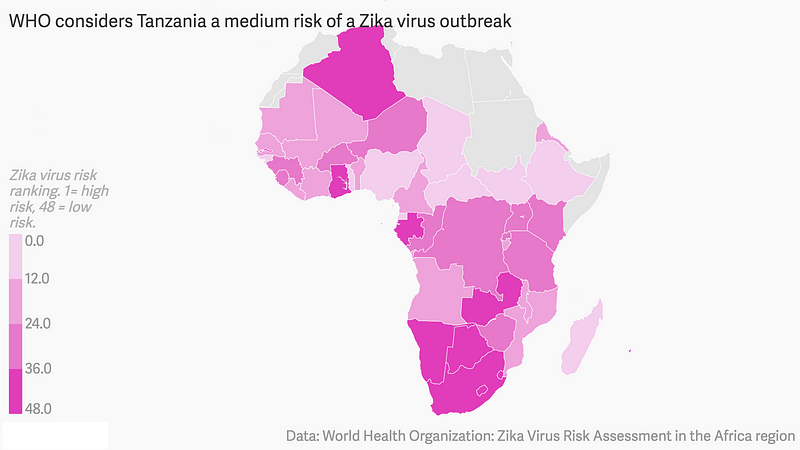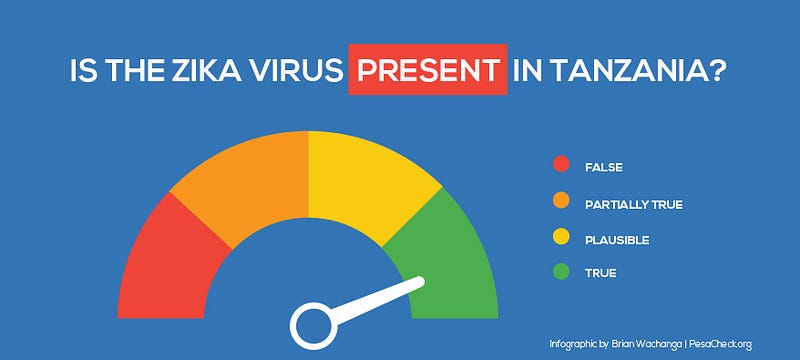On Dec. 15, Dr. Mwele Malecela, the Director General of National Institute of Medical Research (NIMR), as part of the institute’s annual report, announced publicly that the Zika virus is present in Tanzania.
“Zika is in our country and among 533 people that got tested 15.6% were found infected with Zika.” Dr. Mwele Malecela was quoted as saying at a press conference.
Additionally, Dr. Malecela pointed out that a NIMR study conducted with with Bugando Catholic University of Health and Allied Sciences based in Mwanza, northern Tanzania, found that of 80 babies tested, 35 (43%) were found to be positive with the Zika virus.
“The study aimed at finding out whether the virus exists in the country and if it bore effects on children born with physical disabilities,” Dr. Malecela was quoted as saying by the Daily News.
These statements would seem to contradict earlier comments made by the Minister of Health, Hon. Ummy Mwalimu who in Feb. 2016 announced that Zika had not yet entered the country.
#TZ govt sacks @mwelentuli after confirming that Zika virus is endemic to #Tanzania contrary to govt that denies its existence pic.twitter.com/Mp6d2KqLxC
— supadada (@tulanana) December 16, 2016
A day after Dr. Malecela’s announcement the minister refined her comments slightly, suggesting that there was no evidence of an “outbreak” of Zika in the country.
“No Zika virus has been verified in the country so far,” Mwalimu said, according to Xinhua news, a Chinese news agency. “The Zika virus is an international reportable disease of which any discerned condition must be verified by the WHO in collaboration with the office of the Chief Government Medical Officer in the respective country.”
She added, “I wish to assure people that, for now, the presence of Zika disease has not been verified.”
Following this public disagreement between the minister and Dr. Malecela, the latter was sacked as the head of NIMR.
But the question remains — do we have Zika in Tanzania or not? After all, for a country with a fertility rate of about 5 births per woman, the claim that Zika virus may be present in Tanzania needs to be looked into.
PesaCheck has researched the issue, and finds that the claim made by Dr. Mwele is TRUE. It is also worth noting that the minister was right in saying that there is no "outbreak" of Zika in Tanzania. And here is the reason why:
The WHO states that the first human case of the Zika virus was first detected in Uganda and Tanzania in 1952. The discovery was made in a study which found neutralising antibodies to Zika in these countries.
Additionally, in a Feb. 2016 “Zika Virus Risk Assessment in the WHO African region” Tanzania is classified at medium risk of having an outbreak of the Zika virus. Such countries are expected to prioritise clinical and Malaria control.

The US-based Centers for Disease Control and Prevention (CDC) has in its advisory on Tanzania, asked travellers to take precautions as the country is in a region where Zika is endemic (meaning that Zika poses no danger to majority of the people as they have developed immunity to the disease). But they said that "the risk to travelers is low." In such countries, though a few cases of Zika may be reported, they are not in large enough numbers to be considered an outbreak and therefore pose ‘lower risk of danger’. In such countries the infection rate is low compared to places where the virus is newly introduced.
The WHO’s Zika situation report of Dec. 23, 2016 does not mention there being any report of persons with Zika symptoms in Tanzania. The WHO representative Dr Grace Suguti affirmed this report, according to Mwananchi.
However, a WHO memo indicates that the “findings (though preliminary and yet to be validated) provide an opportunity for further investigations and a detailed review of the public health interventions and to further strengthen preparedness activities for Zika virus.”

The claim by Dr. Mwele Malecela saying the Zika virus is present in Tanzania is therefore TRUE. While, Minister of Health, Hon. Ummy Mwalimu is correct in saying there is currently no outbreak, its presence in the country has been known since the 1950s. It is also true that there may be some cases of people who have shown the symptoms of the disease but this requires further investigation, as per the WHO memo. It is also true that the cases of people with Zika-style symptoms does not merit WHO declaring an outbreak in Tanzania.
Do you want us to fact-check something? Write to us and we’ll help ensure you’re not getting bamboozled.
This report was written by PesaCheck Fellow Mwegelo Kapinga who is a development consultant, researcher and writer. Mwegelo has previously worked for Twaweza East Africa as a research analyst. The infographics are by PesaCheck Fellow Brian Wachanga, who is a Kenyan civic technologist interested in data visualisation. This report was edited by Omar Mohammed and Catherine Gicheru.
PesaCheck, co-founded by Catherine Gicheru, is East Africa’s first fact-checking initiative. It seeks to help the public separate fact from fiction in public pronouncements about the numbers that shape our world, with a special emphasis on pronouncements about public finances that shape government’s delivery of so-called ‘Sustainable Development Goals’ or SDG public services, such as healthcare, rural development and access to water / sanitation. PesaCheck also tests the accuracy of media reportage. To find out more about the project, visit pesacheck.org.
